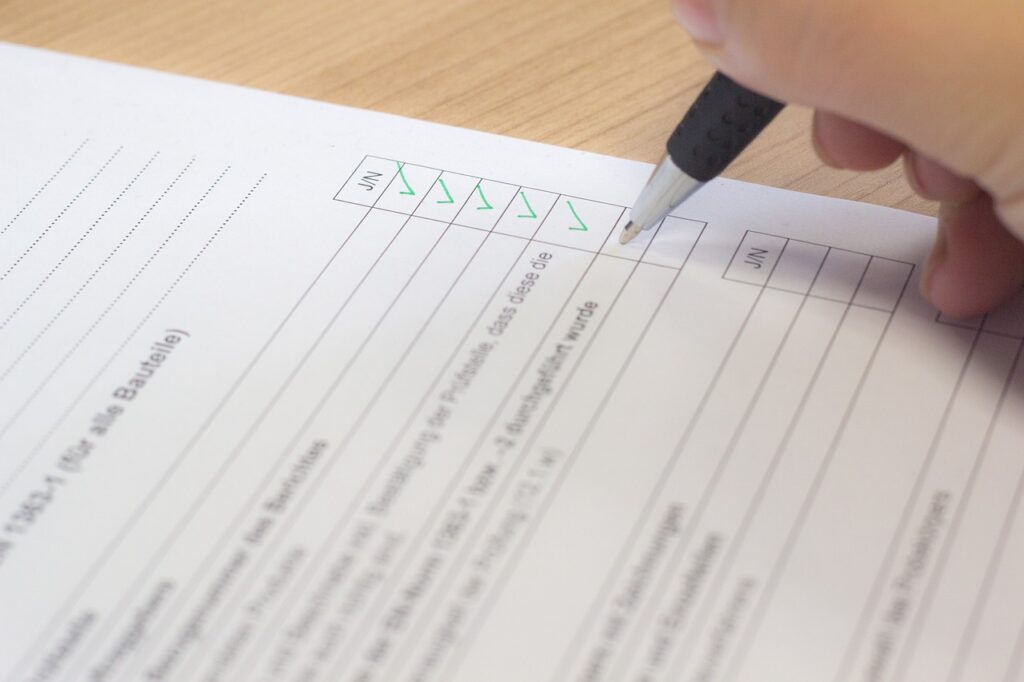Are you thinking about taking up a career of Millwrights in Canada? Well, if you are, here are a few things you should know about this career path before jumping in.
Continue readingShould You Take up a Survival Job? A Fresh Perspective
There are certain things worth considering before taking up a survival job in Canada. It can be a lifesaver or bridge to better thing, depending on what position you are in career-wise and financially. Let’s have a look!
Continue readingTips for Candidates: How to Breeze Through Your Temporary Job Interview
A temporary job interview can be a fast-paced endeavor and you need to make sure that you are prepared. Here are some tips and tricks that should help you move through the process a little smoother.
Continue reading6 Tips to Turn a Temporary Job into a Permanent One
A temporary job is a great opportunity to move into a permanent position within a company. You just need to know how.
Continue reading10 Survival Jobs in Canada Worth Considering
When it comes to survival jobs, they can be more than just a means of putting bread on the table. They can be a means of gaining valuable Canadian work experience.
Continue readingCanadian Labour Laws: The Rights of a Temporary Foreign Worker
Canada offers several protections and benefits to temp workers and minimum wage earners in the form of labour laws and legislations. Know what they are!
Continue readingHow to Become to Permanent Resident in Canada as a Temporary Worker
Most who move to Canada as a temporary foreign worker do so with the hope of becoming a permanent resident. In this blog, we talk about certain things you should know before you shoot your shot.
Continue readingHiring Temporary Foreign Workers: Everything You Need to Know
Hiring Temporary Foreign Workers: Everything You Need to Know
The Government of Canada allows organizations to hire foreign nationals under the Temporary Foreign Workers Program (TFWP). To address the issue of skill and workforce shortages among small companies, employers seek the services of temporary workers. They do this as it provides an avenue for them to solve their labour requirements.
The Federal Department of Citizenship and Immigration Canada (CIC), as well as the Employment and Social Development Canada (ESDC), play a major role in deciding if a candidate is eligible for a work permit. They will determine if hiring a temporary worker will support economic growth in Canada. In this blog, we go over some of the main factors you, as an employer, need to know before hiring temporary foreign workers.
1. The employer decides if a Positive Labour Market Impact Assessment (LMIA) from ESDC is required
The Labour Market Impact Assessment is a confirmation service handled by the Canadian Government. Foreign workers are required to qualify for this before they are eligible to be hired. In most cases an LMIA is required. However, there are some cases in which it is not needed due to special pilot programs or International agreements that exist.
The types of jobs that do not require an LMIA are ones considered to be in the best interest of Canada. Other factors include jobs that are in an international trade accord. They can also be part of an accord between the federal government and a territorial/provincial government. A positive assessment will be provided when hiring a foreign worker does not have any negative impact on the Canadian labour market.
2. If an LMIA is required, an employer can apply for it from the ESDC
Employment and Social Development Canada will make its decision based on multiple factors. The ESDC will consider if the job offer is genuine. It also depends on if the foreign worker will fill a labour shortage in the province. The ESDC considers if the wages and working conditions are compatible with those offered to Canadians working in the same occupation as well. When an employer applies for an LMIA, the ESDC will also check if:

- The hiring of temporary foreign workers will not affect a labour dispute of the employment of a Canadian citizen involved in such a dispute.
- The employer was thorough in their hiring and training process for the job (in this case the employer will need proof of recruitment efforts).
- The recruitment of a temporary foreign worker will create new opportunities for Canadian citizens or help retain jobs.
- The foreign workers will transfer their knowledge and skills to Canadians.
“Acquiring the right talent is the most important key to growth. Hiring was – and still is – the most important think we do.” – Marc Bennioff, Chairman and co-CEO of Salesforce

3. The employer has to select and hire a temporary foreign worker according to their requirement
The final decision of hiring temporary foreign workers rests solely in the hands of an employer. They have to recruit and hire a suitable foreign worker who will fit the job requirement. The employer should provide a job offer that meets the prevailing wage rates and labour standards. Once the ESDC provides a positive LMIA and approves the job offer, the employer can send it to the foreign worker. They will also send a letter of employment so that the candidate may apply for a work permit.
4. The temporary foreign worker has to apply to the Federal government for a work permit
After receiving the positive LMIA from the employer, the foreign worker has to apply for a work permit to legally work in Canada. Most of the time the worker needs to apply for a permit from outside Canada at a visa office in their own country. In some cases, the temporary workers can apply for a work permit at a Canadian port of entry. However, this only applies if they already have the necessary documents.
The employer needs to ensure the temporary foreign workers have the right documentation to enter Canada. This may include a visitor’s visa or an Electronic Traveller’s authorization (eTA). When applying for a work permit a temporary worker needs to also check if a temporary visa is required. A visa officer will process the worker’s application for it along with the work permit. So there you have it, these are some of the main concepts and guidelines that you need to keep in mind when hiring from outside of Canada.
Disclaimer: Please note that these guidelines and regulations are only the recent updates as of March 2022, and may change at a later date. Keep this in mind going forward and be sure to keep yourself apprised of the latest developments in guidelines and rules issued by the Canadian government before the worker immigrates.
Recent Posts
The Dos and Don’ts of Conducting Background Checks for Employment
The Pros and Cons of Pre Employment Testing and How to Implement Them
Mastering the Art of Interviewing: Techniques for Identifying Top Talent
The Ultimate Guide to Resume Screening: How to Identify the Best Candidates
The Dos and Don’ts of Writing Effective Job Descriptions
How to Conduct a Thorough Job Analysis for Better Recruitment Results
Canadian Immigration Guidelines 2022: An Overview for Temporary Foreign Workers
Canadian Immigration Guidelines 2022: An Overview for Temporary Foreign Workers
As of 2022 January, with the emergence of new Covid-19 variants, many countries, including Canada, have revised their immigration policies and travel guidelines. At the beginning of the year, the Canadian government revised many of its policies which have to be strictly adhered to if one wishes to travel to the country. In this blog, we talk about these Canadian immigration guidelines that you, as a temporary foreign worker, should keep in mind before booking your tickets.
Also, please note that these guidelines and regulations are only the recent updates as of March 2022, and may change at a later date. So, keep this in mind going forward and be sure to keep yourself apprised of the latest developments in guidelines and rules issued by the Canadian government before you emigrate.
A Recap of the Latest Immigration Initiatives for 2022
Before we get into the who and what of it all, let’s do a quick recap of what the Canadian government has recently laid out. According to a news report by the CIC Times, Canada plans to welcome around 432,000 immigrants in 2022. This is taking place under the Immigration Levels Plan 2022-2024.
The plan, as reported by the CIC Times, cited Immigration Minister Sean Fraser as saying that the plan focuses on recruiting qualified people who will contribute to the Canadian economy. He was quoted as stating that it was to address the labour deficit. The news outlet also cited that around 56% of new immigrants this year would enter through economic class channels. This includes Express Entry, the Provincial Nominee Program (PNP), as well as the Temporary to Permanent Residence (TR2PR) stream.
Canadian Immigration Guidelines: Who Can Travel to Canada?
To enter Canada, you need to be fully vaccinated for one. If not, there is the whole matter of having to undergo quarantine. If you are an exempt traveller, then you might not need to be fully vaccinated, but still, need to adhere to certain guidelines. Keep in mind that regardless of if you are an essential traveller or non-essential traveller you still need to be vaccinated.

Here are the categories of travellers who were previously allowed to cross into Canada even if they are not vaccinated:
- Foreign Students who are 18 years of age or older.
- Athletes
- Work permit holders as well as temporary foreign workers who are employed in the agriculture and food processing field.
- Family members of Canadian citizens.
- Permanent residents
- Those passing through Canada to go to another country
- Foreign nationals who hold a valid Confirmation of Permanent Residence (COPR)
- Those travelling on humanitarian grounds
- Maine crew, including commercial fishing vessels
- Diplomats and family members
- As well as certain French citizens
Revised Canadian Immigration Guidelines
Now, as of January 2022, some of these categories were revised. Certain groups of travellers who were previously allowed to travel without vaccination, now have to get both doses before entering the country. According to the latest Canadian immigration guidelines, family reunification travellers, International students, athletes, essential service providers and temporary foreign workers are required to be vaccinated.
“Pleasure in the job puts perfection in the work.“ – Aristotle, Greek Philosopher
The Temporary Foreign Worker Program
As a temporary foreign worker, you can immigrate to Canada under the Temporary Foreign Worker Program. This allows you a variety of options given that your employer adheres to the Labour Market Impact Assessment (LMIA) guidelines and the recent changes that the program underwent due to Covid-19.
However, before we get into the recent changes, you should know your options. As a temp worker coming into Canada, you also have many paths you can opt for. This includes the likes of the Express Entry system or the Global Talent Stream. The former is for the hiring of skilled foreign workers to support their permanent residency through the economic immigration program. The latter is to hire select talent or in-demand workers in specific ICT (Information and Communication Technology) or STEM (Science, technology, engineering, and mathematics) jobs.
Canadian immigration guidelines also state that you could gain entry if you are looking for a temp job in the fields of academics, agriculture (as we mentioned above), and caregiving. Now, if you are coming for work in the province of Quebec, well that’s a whole different story as the province has a set of unique guidelines in and of itself.

Canadian Immigration Guidelines: Covid-19 Measures to Keep in Mind
Now, let’s get down to some of the newer guidelines and the changes done to the TFWP. With the country combating the covid-19 levels, one of the most important things you need to adhere to is the public health measures that are in place. You should follow all the guidelines regardless of your vaccination status. Secondly, before you make your travel arrangements, you need to verify that the position you applied for is still available with your employer or the Ministry of Labour (if you are with the Seasonal Agricultural Worker Program [SAWP]).
You also need to keep a close eye on the email that you receive from the IRCC (Immigration, Refugees and Citizenship Canada) for whatever else they advise. Next, with the enhanced border measures that were put in place, you will be subjected to testing and quarantine (if need be) upon arrival. For this part of the process, you need to use the ‘ArriveCAN’ app to provide mandatory travel and quarantine information after your entry. Be sure to review Canada’s pre-entry testing requirements though.
“It always seems impossible until it’s done.“ – Nelson Mandela, Former President of South Africa
What to Know for Your Stay in Canada
There are a few things you need to know after you arrive in the country. One of the first things is your rights as a temporary foreign worker. This includes a wide variety of subject areas including management of workplace abuse to help and support organizations. Be sure to read up on that.
Along the same lines, you should keep in mind that your employer legally cannot end your contract if you are sick with Covid-19. You might also be eligible for Covid-19 benefits and services if you miss work as a result. There is also a possibility of paid or unpaid sick leave depending on the terms of your employment contract, as well as the federal, provincial or territorial employment standards.
Recent Posts
The Dos and Don’ts of Conducting Background Checks for Employment
The Pros and Cons of Pre Employment Testing and How to Implement Them
Mastering the Art of Interviewing: Techniques for Identifying Top Talent
The Ultimate Guide to Resume Screening: How to Identify the Best Candidates
The Dos and Don’ts of Writing Effective Job Descriptions
How to Conduct a Thorough Job Analysis for Better Recruitment Results
Getting a Temporary Survival Job in Canada: A Guide to Success
Getting a Temporary Survival Job in Canada: A Guide to Success
Whether you are a highly qualified professional or a student in Canada, there are those times when one needs to turn to ‘Plan B’ as it were. If you have been unemployed for a while and need a job, or you need some extra cash, survival jobs are a great option to consider. These jobs provide you with enough money to get by while you get your ducks in a row. There is no shame in taking a temporary survival job, especially when the job market is tight and funds are needed to sustain yourself.
However, it may be easier said than done. Landing a temp job can be tricky given the level of competition that you might face, especially when the market is down. In this blog, we offer you seven tips on what you should and should not do when trying to find and secure jobs in this line of work.
1) Choose a Temporary Survival Job You Like
Before you get too far down the rabbit hole with your job search, consider which line of work will best suit you. If you are an extroverted person who enjoys conversation and music, then you might want to consider becoming a bartender. If you prefer a quieter setting, then maybe a tutor. Either way, just make sure it is something you can enjoy doing. Another benefit it serves is, if you choose a career you like, you drive up your chances of landing the job, given you show genuine enthusiasm.
2) Try to Stay in Your Niche
Before you take up a temporary survival job like tutoring, bartending or general labour, you might want to consider sticking to your field. Even if you have to take a job at a lower position, you retain the element of consistency. This is crucial when you are working towards the dream job you studied and worked for. However, if you do aim for a survival job outside your field, try and go for something that will give you time to search for your dream job.

3) Tone Down the Resume for a Temporary Survival Job
A long, verbose resume with big-wig job titles and experiences shouts ‘over-qualified’. That is something you want to avoid when hunting for a temporary survival job. Yes, you should be honest in your resume. However, it is okay to de-emphasize things that make you more relatable. Your resume should match the level of work you are aiming for. Consider highlighting your strengths and skills in relating to people, work ethic and other things that will allow you to perform the job better.
4) Stay Positive
A positive attitude has a massive impact on the outcome of the interview. let’s say for example, that you were laid off from a high-level job in the manufacturing industry and you have to take up a job as a barista. The interviewer will feel your disdain for serving customers drinks if you come at it as a step-down. Think of it as an opportunity to stay afloat, a life raft of sorts. A grateful and positive attitude will go a long way.
“We must accept finite disappointment, but we must never lose infinite hope.” – Martin Luther King Jr., American Minister

5) Be Open to Learning New Things from Temporary Survival Jobs
It’s good to be confident in your ability when attending an interview, but humility is also important. Remember, you are trying to land a survival job, for which you may not have any prior experience. Just because you were an expert in the IT department in your old job, doesn’t mean you have the skills to be a top-notch bartender yet. So, be open to learning new things, and communicate that to your interviewer. Let them know that you are very teachable and dependable.
6) Prepare for the Interview
When attending the interview for a temporary survival job, you need to keep three things in mind. The interviewer will be looking for very specific skills, yes, but they also want to know if you have the soft skills it takes to do the job. Specifically, are you a team player, will you cause any problems and are you open to learning on the job. If you can eliminate these concerns coming out the gate, you drive up the chances of landing that job. You can also quench any doubts regarding your over-qualifications by saying things like, “I have always been commended on my people skills.” or ” I know how to calm a situation down.” These statements demonstrate critical social skills that one might need.
7) Don't Get too Personal
Look, you wouldn’t be taking this job if it weren’t for the fact that you are falling on hard times. But, that is no reason to bring that up during the interview unless they ask. Even then just the bare minimum details will do most of the time. Desperation, however real, is not professional, and you should be approaching this job like any other interview. Keep things professional, polite and away from your personal life.
















